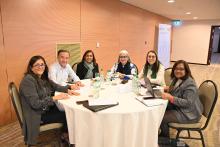Technical Meeting: Training and Certification for Caregiving in Latin America and the Caribbean
Care work, both paid and unpaid, is of vital importance for achieving sustainable, egalitarian, inclusive societies that generate decent jobs.
In this context, the design and implementation of policies to improve care work has become very important in Latin America and the Caribbean, and one of the areas of intervention prioritized has been the improvement of training and certification of labor competencies in the sector. Both contribute to making caregiving tasks more visible and valued; to professionalizing the work that is currently performed in an unpaid manner or to certifying those who already perform it in a paid manner; they also have the potential to contribute to improving the quality of the care services provided by setting standards to be applied throughout the territory and to contribute to the development of this sector of activity as a post-pandemic economic reactivation.
Within this framework, in 2022 the ILO initiated a process of exchange and reflection with a network of professional training institutions and ministries of labor to understand the role of professional training in the framework of national policies to meet the demands of care, including the identification of good practices to establish common quality guidelines and the definition of a guide with steps to incorporate training services and certification of competencies in care. This process has allowed a fundamental advance to learn about the actions developed and to strengthen institutional capacities in training and certification of labor competencies within the framework of the implementation of care policies.
Based on this previous work, and thanks to the support of the ILO's Emerging Cooperation Unit, PARTNERSHIP, together with the ILO Regional Office for Latin America and the Caribbean and the Gender and Non-discrimination Unit, and coordinated by ILO/Cinterfor, we have been able to develop a face-to-face technical meeting of this network of experts from 10 countries in the region (Argentina, Bolivia, Chile, Costa Rica, Colombia, El Salvador, Guatemala, Honduras, Nicaragua and Nicaragua), Bolivia, Chile, Costa Rica, Colombia, El Salvador, Mexico, Panama, Dominican Republic and Uruguay), with the aim of sharing progress and challenges and agreeing on a roadmap to continue working together, defining a common strategy for the survey and generation of information and knowledge, exchange of good practices and sharing of best practices.
The meeting began with an international event entitled: "Work and Care: the role of training and certification of labor competencies in the construction of care systems", which featured prominent panelists, and was also organized as part of the process towards the National Care Forum in Uruguay, an initiative of the United Nations System in Uruguay together with the Pro-Care Network aimed at promoting a technical political process to strengthen and support the care agenda and revitalize a broad coalition of support for the National Integrated Care System (SNIC, for its acronym in Spanish).
During the technical meeting, the group of specialists had the opportunity to learn more about good practices, strengthen ties, create synergies and new articulations, and begin to collectively outline a roadmap to continue strengthening the joint work and sharing the progress achieved.
This roadmap, which will be validated and shared later, includes Cinterfor's commitment to continue coordinating and contributing to achieve sustained transformations in the region and contribute to generate adequate contexts for a better use of the opportunities for decent employment that this sector represents.








